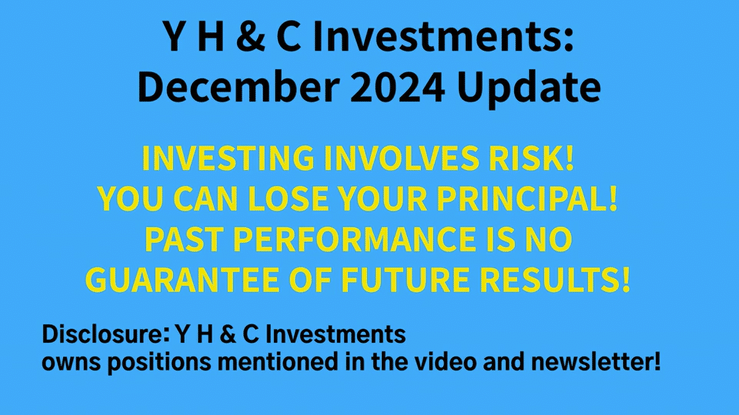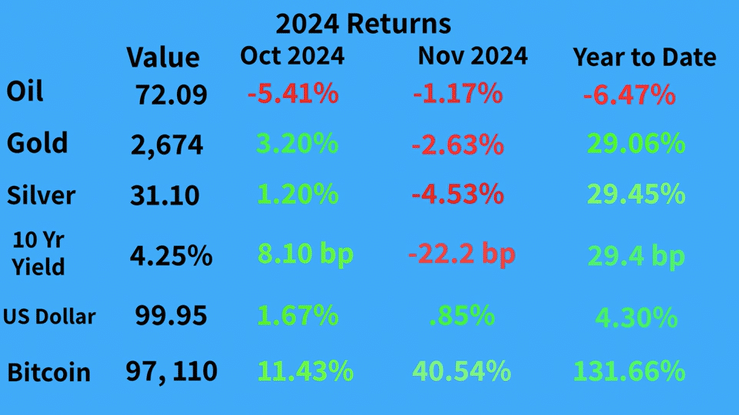Y H & C Investments December 2024 Update
Changes at Liberty and the Election.....
Y H & C Investments: Waving a Magic Wand?
(Return figures come from the November 29, 2024, edition of the Wall St. Journal. Y H & C Investments may have positions in companies mentioned in this newsletter. Nothing in the newsletter should be taken as an offer to buy or sell individual securities. It is the responsibility of each investor to research the investments mentioned so they can decide on the appropriateness and suitability of the investments consistent with their risk tolerance, risk constraints, and return objectives)
Rick Pitino is a legendary basketball coach who currently coaches at St. John’s University. Prior to this job, he led Iona, Louisville, Kentucky, the Boston Celtics, the New York Knicks, and Providence College. One of his most famous moments was after a particularly difficult loss with the Celtics, he remarked that Larry Bird, Kevin McHale, and Robert Parrish were not going to come walking through the door to save the franchise. Why do I bring this up and how is it applicable to investing?
Mr. Pitino’s point at the time was the Celtics team consisted of young players who aimed to improve. They were not going to magically obtain older Celtic legends who would suddenly appear to save the current version. As for investing, it is applicable in that typically there are no magic wands to wave for your holdings. You cannot snap your fingers and make what you own go up one thousand percent in a short time frame. Most of the time you buy something and initially it goes down. It may not move much for a long while. And then, after a lengthy wait, the company executes its plan and posts good numbers, and you begin to see results in the stock.
Does it always happen like this? No, and the sequence and time frame may vary, but in many instances having success often follows this scenario. Now, there is no hard and fast rule, and every situation is different. Once in a while you may be very fortunate and get a quick return. I’ll note a company I sat in on during their presentation at LD Micro last month. It is a maker of drone supplies with the thesis being they will make the component parts in the United States. It has very little revenue and no profits anywhere in sight. I asked a question during the presentation and did not like the answer. Its stock price was languishing around a dollar with very minimal value. A few days ago, the son of the president elect joined the board. Three days later, the stock has gone up nearly twenty-fold. In another similar case, a drone manufacturer with a small government contract announced it was awarded a much larger prize most analysts thought it would not win. Prior to the announcement, it has less than 20 million in revenue and a sub one dollar stock price. The contract was for at least two hundred fifty million dollars over several years. The stock now trades near twelve bucks a share, and this has happened in less than a week. So you never know, but most of the time you do. There are no magic wands to wave to make your stock go up. Unless, of course, the President elect’s son joins the board.
Spanning the Globe: Greg Maffei Exits Liberty, and Election Ramifications
A few weeks ago, the current CEO of Liberty Media, Greg Maffei, announced he was stepping down from his post as head of Liberty. Y H & C Investments and it’s investors have benefited from Liberty and Mr. Maffei’s leadership over the last nineteen years. Over this time frame, annualized returns from all holdings at Liberty came in at around 17% per year, well ahead of the 11% posted by the S&P- (note these figures come from Liberty and they are an estimate).
First, let’s provide some context. Mr. Maffei became CEO of Liberty during the aftermath of the internet bubble. Liberty owned quite a few minority positions in many well-known companies (News Corp, IAC Interactive, Discovery, Liberty Global, and a few others), and had just bought control of QVC. The ownership position in QVC gave it access to a very profitable asset. It used this asset to build cash and start making deals which led to immense value creation in quite a few separate cases. Liberty’s most famous deal was lending over $500 million to Sirius XM Satellite (https://www.libertymedia.com/news/detail/391/sirius-xm-radio-and-liberty-media-reach-agreement-for). It essentially bought a 40% stake in the equity at less than five cents a share. It got paid back in six months and the stock did very well for about five years. Maffei and John Malone were instrumental in making this deal happen. Charter and Live Nation were other big winners. Charter was bought out of bankruptcy and had something like a 10-billion-dollar tax loss carryforward. Live Nation owned Ticketmaster. Liberty bought controlling positions and installed it’s own CEO’s. The new leadership brought more efficiency, and in the case of Live Nation, the business has grown at least ten-fold. Other big successes were swapping the stake in News Corp for control of DirecTV, cash and the Atlanta Braves. DirecTV got new leadership and was ultimately sold to AT&T for a much higher price. The cash was ultimately used to buy control of Formula1 Racing. Formula1 was bought for about 8 billion dollars and today it is worth nearly 20 billion. The Braves were a throw away asset in the deal that Liberty worked with to reimagine the business. It negotiated a much-admired stadium deal with many more aspects to help improve the business model. It had success on the field by winning six consecutive league titles and one World Series title. So, what investing lessons can we take from Mr. Maffei and Liberty?
First, choose great businesses with exceptional leaders that have a large economic incentive to make the business do well. You want people in charge who have proven they can make the business go from X to 3X to 5X to 10X in earnings power. Second, focus your assets on situations you believe in and buy as a big a stake as possible. Third, concentrate your holdings on areas where you feel you have knowledge, information, structural, or time advantages. Fourth, capitalize on situations where other holders are in some temporary disadvantage you can use to your benefit. Fifth, use your imagination of what something can ultimately become, not where it sits today. In terms of where Maffei and Liberty did not succeed, in both the case of QVC and Sirius, the inability to reinvest to create improved earnings power is a critical drawback. As has been proven over and over, the market rewards growing profitability. Everything else has been, and will probably continue to be, shunned. In sum, Maffei is a great corporate executive who has a proven track record of knowing how to create value. He will resurface and we will be watching to see where he lands. Thank you for your efforts, Mr. Maffei.
Donald Trump’s election as the 47th President of the United States has major implications for investors all over the world. As far as the election is concerned, it really wasn’t much of a contest. The Democrats turned to a candidate who never won an electoral college vote in the primary. Is it really a shock that she was badly beaten?
As for market implications, areas like traditional and alternative energy, defense, health care, media, banking, capital markets, and naturally, crypto are all segments which are going to see big changes. You should see a much more active merger and acquisition environment with deal volumes picking up significantly. A big focus will be the big three, trade, tariffs, and taxes. In looking at the rest of the year, tax loss selling and repositioning portfolios for the new administration will be most participants priorities.
Y H & C In November- Building Existing Holdings with the Little Ones-
As far as November is concerned, the vast majority of our positions in larger companies performed well, other than the energy area. Energy remains the segment which is always the whipping boy. If things are bad, sell energy. If things are good, sell energy. If things are so so, sell energy. Are you noticing a pattern?
The last few months of the year are usually a misleading period. Winners win and losers lose. Tax loss selling is a priority so anything which has not performed is a candidate for selling. As the small and microcap area is shunned by many institutions, many positions get sold for no reason other than it is just the standard market dynamic during the season. Consequently, a few of our big holdings in small and microcaps have sold off over the last month. You should know we have been adding to these companies and anticipate doing more of the same for the balance of the year. It is also a time where markets traditionally rally during the holiday season. At this point, I wouldn’t expect much to change but with markets anything can and does take place. Thank you for your interest and if you have any questions or comments, please say hello at information@y-hc.com. I hope you have a great month and enjoy the holidays!
Y H & C Investments may have positions in companies mentioned in this newsletter. Nothing in the newsletter should be taken as an offer to buy or sell individual securities. It is the responsibility of each investor to research the investments mentioned so they can decide on the appropriateness and suitability of the investments consistent with their risk tolerance, risk constraints, and return objectives)






